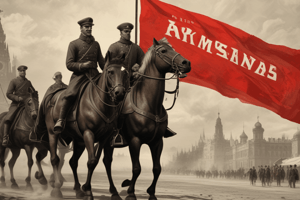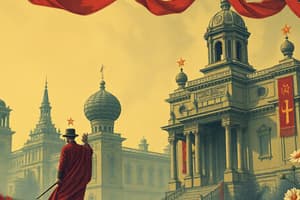Podcast
Questions and Answers
When did the Russian Revolution begin?
When did the Russian Revolution begin?
- 1920
- 1917 (correct)
- 1918
- 1914
Who led the leftist Bolshevik party during the Russian Revolution?
Who led the leftist Bolshevik party during the Russian Revolution?
- Vladimir Lenin (correct)
- Mikhail Gorbachev
- Czar Nicholas II
- Leon Trotsky
What event marked the start of the Socialist period under Lenin?
What event marked the start of the Socialist period under Lenin?
- October Revolution (correct)
- Introduction of perestroika
- February Revolution
- Dissolution of the USSR
What was one of the main characteristics of the new political system established after the Russian Revolution?
What was one of the main characteristics of the new political system established after the Russian Revolution?
Why did Lenin establish the USSR?
Why did Lenin establish the USSR?
What reforms introduced by Gorbachev eventually led to the dissolution of the USSR?
What reforms introduced by Gorbachev eventually led to the dissolution of the USSR?
What is a major criticism of Stalin's rule?
What is a major criticism of Stalin's rule?
Which term best describes the USSR's policy towards Eastern Europe after World War II?
Which term best describes the USSR's policy towards Eastern Europe after World War II?
How did the Russian Revolution impact global discussions on economics and politics?
How did the Russian Revolution impact global discussions on economics and politics?
What was a key feature of the USSR's control over Eastern Europe after World War II?
What was a key feature of the USSR's control over Eastern Europe after World War II?
Which aspect of Stalin's rule resulted in millions of deaths?
Which aspect of Stalin's rule resulted in millions of deaths?
Which economic transition did the New Economic Policy in Russia aim to achieve?
Which economic transition did the New Economic Policy in Russia aim to achieve?
What political party led the Russian Revolution of 1917?
What political party led the Russian Revolution of 1917?
What contributed to food shortages in early Soviet society after the revolution?
What contributed to food shortages in early Soviet society after the revolution?
What was a major challenge faced by the implementation of socialism in Russia?
What was a major challenge faced by the implementation of socialism in Russia?
Who succeeded Vladimir Lenin as the leader of the Soviet Union after his death in 1924?
Who succeeded Vladimir Lenin as the leader of the Soviet Union after his death in 1924?
Which labor organizations were influenced by Marxist theories before the Russian Revolution?
Which labor organizations were influenced by Marxist theories before the Russian Revolution?
Study Notes
The Russian Revolution
The Russian Revolution was a pivotal event that transformed Russia from a monarchy into the Soviet Union, with profound effects on global politics that continue today. It began in February 1917 during World War I with widespread discontent among workers and soldiers, leading to riots. This prompted Czar Nicholas II's abdication, ending centuries of Romanov rule. However, it did not last long; within eight months, power shifted again, this time to the leftist Bolshevik party led by Vladimir Lenin.
The October Revolution, which marked the start of the Socialist period under Lenin, occurred when Red Guards stormed the Winter Palace in Petrograd (now St. Petersburg) and took over the government. A new political system replaced the old one, characterized by strict control of economic matters, elimination of private property through collectivization, state regulation of production, and social equality based on common ownership of all means of production.
Lenin believed that Russia could leapfrog ahead economically if it adopted socialism first before going through capitalism, so he established the USSR (Union of Soviet Socialist Republics). Over the next seven decades, communist governments ran Russia until Mikhail Gorbachev introduced perestroika (restructuring), glasnost (openness), and demokratizatsiya (democratization), eventually leading to the dissolution of the USSR in December 1991.
Despite its collapse, aspects of socialism remain influential worldwide: democratic countries have embraced elements like universal healthcare coverage, unemployment insurance, and free education up to university level. While some argue against such systems because they reduce incentive and innovation while increasing bureaucracy, others maintain their appeal due to perceived benefits like wealth distribution and protection of worker rights.
In summary, the Russian Revolution was a significant event that shifted Russia from a monarchy to a communist state. Although the USSR has since collapsed, certain principles of socialism still resonate globally—a reminder of how far-reaching consequences can stem from a single historical occurrence.
Studying That Suits You
Use AI to generate personalized quizzes and flashcards to suit your learning preferences.
Description
Test your knowledge about the Russian Revolution, a turning point in Russian history that led to the fall of the monarchy and the rise of communism under Lenin's Bolshevik party. Explore the key events, ideologies, and impacts of this transformative period.




